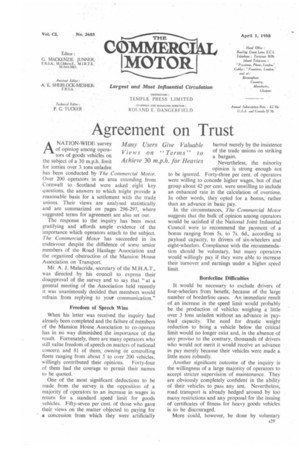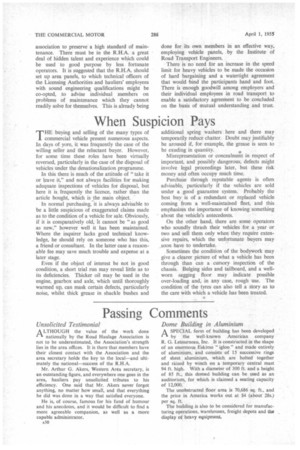Agreement on Trust A NATION-WIDE survey of opinioi among operators of
Page 31

Page 32

If you've noticed an error in this article please click here to report it so we can fix it.
goods vehicles on the subject of a 30 m.p.h. limit for lorries over 3 tons unladen has been conducted by The Commercial Motor. Over 200 operators in an area extending from Cornwall to Scotland were asked eight key questions, the answers to which might provide a reasonable basis for a settlement with the trade unions. Their views are analysed statistically and are summarized on pages 296-297, where suggested terms for agreement are also set out.
The response to the inquiry has been most gratifying and affords ample evidence of the importance which operators attach to the subject. The Commercial Motor has succeeded in its endeavour despite the diffidence of some senior members of the Road Haulage Association and the organized obstruction of the Mansion House Association on Transport.
Mr. A. J. Malacrida, secretary of the M.H.A.T., was directed by his council to express their disapproval of the survey and to say that "at a general meeting of the Association held recently it was unanimously decided that members would refrain from replying to yout communication."
Freedom of Speech Wins When his letter was received the inquiry had already been completed and the failure of members of the Mansion House Association to co-operate has in no way diminished the importance of the result. Fortunately, there are many operators who still value freedom of speech on matters of national concern and 81 of them, owning or controlling fleets ranging from about 5 to over 200 vehicles, willingly contributed their opinions. Forty-four of them had the courage to permit their names to be quoted.
One of the most significant deductions to be made from the survey is the opposition of a majority of operators to an increase in wages in return for a standard speed limit for goods vehicles. Fifty-seven per cent. of those who gave their views on the matter objected to paying for ' a concession from which they were artificially barred merely by the insistence of the trade unions on striking a bargain.
Nevertheless, the minority opinion is strong enough not to be ignored. Forty-three per cent. of operators were willing to concede higher wages, but of that group about 42 per cent, were unwilling to include an enhanced rate in the calculation of., overtime. In other words, they opted for a bonus, rather than an advance in basic pay.
In the circumstances, The Commercial Motor suggests that the bulk of opinion among operators would be satisfied if the National Joint Industrial Council were to recommend the payment of a bonus ranging from 5s. to 7s. 6d., according to payload capacity, to drivers of six-wheelers and eight-wheelers. Compliance with the recommendation should be voluntary, but many operators would willingly pay if they were able to increase their turnover and earnings under a higher speed limit.
Borderline Difficulties It would be necessary to exclude drivers of four-wheelers from benefit, because of the large number of borderline cases. An immediate result of an increase in the speed limit would probably be the production of vehicles weighing a little over 3 tons unladen without an advance in payload capacity. The need for drastic weight reduction to bring a vehicle below the critical limit would no longer exist and, in the absence of any proviso to the contrary, thousands of drivers who would not merit it would receive an advance in pay merely because their vehicles were made a little more robustly.
Another significant outcome of the inquiry is the willingness of a large majority of operators to accept stricter supervision of maintenance. They are obviously completely confident in the ability of their vehicles to pass any test. Nevertheless, road transport is already hedged around by too many restrictions and any proposal for the issuing of certificates of fitness for heavy goods vehicles is to be discouraged.
More could, however, be done by voluntary association to preserve a high standard of maintenance. There must be in the R.H.A. a great deal of hidden talent and experience which could be used to good purpose by less fortunate operators. It is suggested that the R.H.A. should set up area panels, to which technical officers of the Licensing Authorities and hauliers' employees with sound engineering qualifications might be co-opted, to advise individual members on problems of maintenance which they cannot readily solve for themselves. This is already being done for its own members in an effective way, employing vehicle panels, by the Institute of Road Transport Engineers.
There is no need for an increase in the speed limit for heavy vehicles to be made the occasion of hard bargaining and a watertight agreement that would bind the participants hand and foot. There is enough goodwill among employers and their individual employees in road transport to enable a satisfactory agreement to be concluded on the basis of mutual understanding and trust.




















































































































